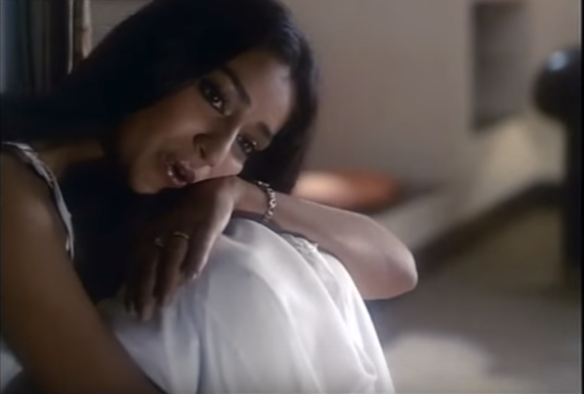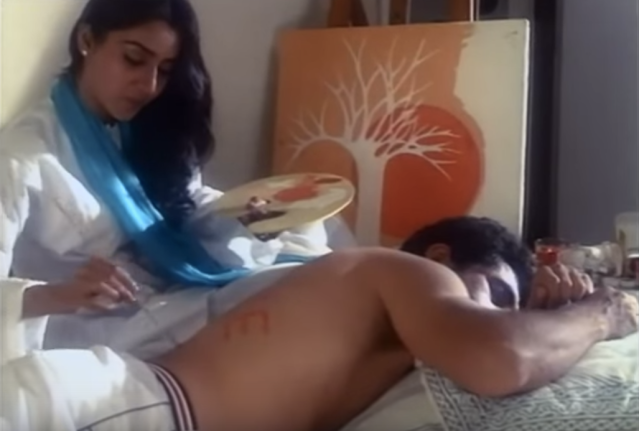
Sunil Dutt sings to Nutan on the telephone in “Jalte Hai Jiske Liye” in Sujata (1959).
Today we present the lyrics and English translation of one of Talat Mehmood’s most memorable hits “Jalte Hai Jiske Liye.” A turning point in the controversial film Sujata (1959), “Jalte Hai Jiske Liye” blends the visuals of modern technology with the thematic subtext of an antiquated discrimination system.
Can we admire the film’s brilliant mis-en-scene and editing for a minute? Though connected by telephone wires, the hero and heroine are worlds apart: he is a Brahmin and (unknown to him) she is an “untouchable.” A light flickers in a deliberate rhythmic fashion behind Sunil Dutt, marking the passage of time like a ticking bomb. For a romantic song, every second is filled with tension: Talat Mehmood’s lilting vocals seem to pull us slowly down a staircase, teasing at each step as if a figurative (and literal) cord may snap. The effect is both beautiful and extremely suspenseful.
But, you may be asking, who is Talat Mehmood? A brief digression is warranted because this critical question is how we distinguish among the three types of classic Bollywood lovers:
The first, a wannabe, has never heard of Talat Mehmood before. You’ve seen Sholay and really liked that Asha remix you heard once at your cousin’s wedding. Welcome to our site, young padawan, and have some chai on us. We cannot express how happy we are that you’re here to learn.
The second knows who Talat Mehmood is for goodness sake, this is insulting. You feel strangely refreshed by that velvety voice dipping into films that otherwise would belong firmly to Rafi or Mukesh. You’ve probably even wept openly to “Jayen to Jayen Kahan” in a public setting, say while riding the train to work or in the waiting room at your dentist. I’m only speculating.
But the third type of Bollywood lover is a Talat Mehmood believer. You know every song to escape his vocal cords as well as each and every of his unicorn-like film appearances (yes, he was a double threat in the industry)! You go well beyond art appreciation, in fact, you feel a sense of personal victimization when you think of all the squandered songs that were tossed at other playback singers that Talat would have crushed (Mahendra Kapoor, I’m looking directly at you).

Nutan is distraught to discover how much Sunil Dutt loves her, knowing she is labeled an “untouchable” in Sujata (1959).
Just kidding, Mahendra, you’ve had shining moments. But “Jalte Hain Jiske Liye” is sure to bring out the third type of Bollywood lover in everyone. It is one of Talat Mehmood’s most accessible songs, buoyed by a lilting composition by S.D. Burman. Follow along with the video here and tell us if we’ve made a Talat believer out of you!
Jalte Hain Jiske Liye Lyrics & Translation
Jalte hai.N jiske liiye terii aakho.N ke diiye, DhuunDh laayaa huu.N wahii giit mai.N tere liiye
I have found those songs for which the lamps of your eyes burn
Jalte hai.N jiske liiye…
That for which your eyes burn…
Dard ban ke jo mere dil mei.N raahaa Dhal na sakaa
What was in my heart became a pain and did not ease
Jaduu ban ke terii aankho.N mei.N rukaa chal na sakaa …
It became magic in your eyes and stopped, and could not go further
Aaj laayaa huu.N wahii giit mai.N tere liiye
Today I have brought those songs for you
Jalte hai.N jiske liiye…
That for which your eyes burn…
Dil mei.N rakh lenaa isse haatho.N se yeh chhuuTe na kahii.N
Keep them in your heart, do not let them escape from your hands
Giit nazuk hai meraa shiishe se bhii, TuuTe na kahii.N
My song is even more fragile than glass, let it not shatter
Gungunaau.Ngaa yehii giit mai.N tere liiye
I will hum this song for you
Jalte hai.N jiske liiye…
That for which your eyes burn…
Jab talak na yeh tere ras ke bhare hoN.To.N se mile
Until this song meets your nectar-filled lips
Yuu.Nhii awaaraa phiregaa yeh terii zulfo.N ke tale
It will wander astray through the shade of your hair
Gaaye jaau.Ngaa yehii giit mai.N tere liiye
I will keep on singing this song for you
Jalte hai.N jiske liiye…
That for which your eyes burn…
Glossary
jalnaa: to burn; aankhe.N: eyes; Dhuu.NDh laanaa: to find (to search [for something] and bring); giit: song; dard: pain; dil: heart; Dhalnaa: to wane; jaduu: magic; ruknaa: to stop; haath: hands; chhuuTnaa: to escape; nazuk: fragile; shiishaa: glass, mirror; TuuTnaa: to break; gungunaanaa: to hum; ras: nectar; hoN.T: lips; awaaraa: wanderer; phiregaa: to stray; zulfe.N: hair; tale: shade
I adore this film’s bold attempt to portray the systemic discrimination wrought by a twisted idea of caste. Based on a story by Bengali author Subodh Ghosh, Sujata is not a perfect film by any means. The ending will leave some feeling hallow, but for a mainstream big budget Bollywood film to finally face this pervasive issue head-on was pioneering. It led Bimal Roy, no stranger to socially-conscience films, to win the Filmfare Award for Best Director in 1959! Check out Ankur (1974) on our list of greatest classic Hindi films ever made if this theme piques your vigilant soul!
Lastly, a juicy shout out to fans G Kumaradevan for requesting this lovely song. Strong choice, sir!
– Mrs. 55




